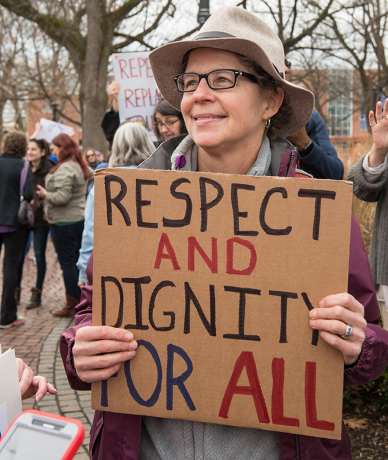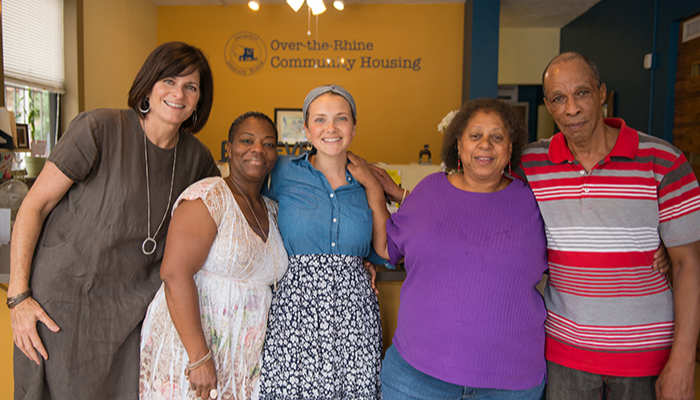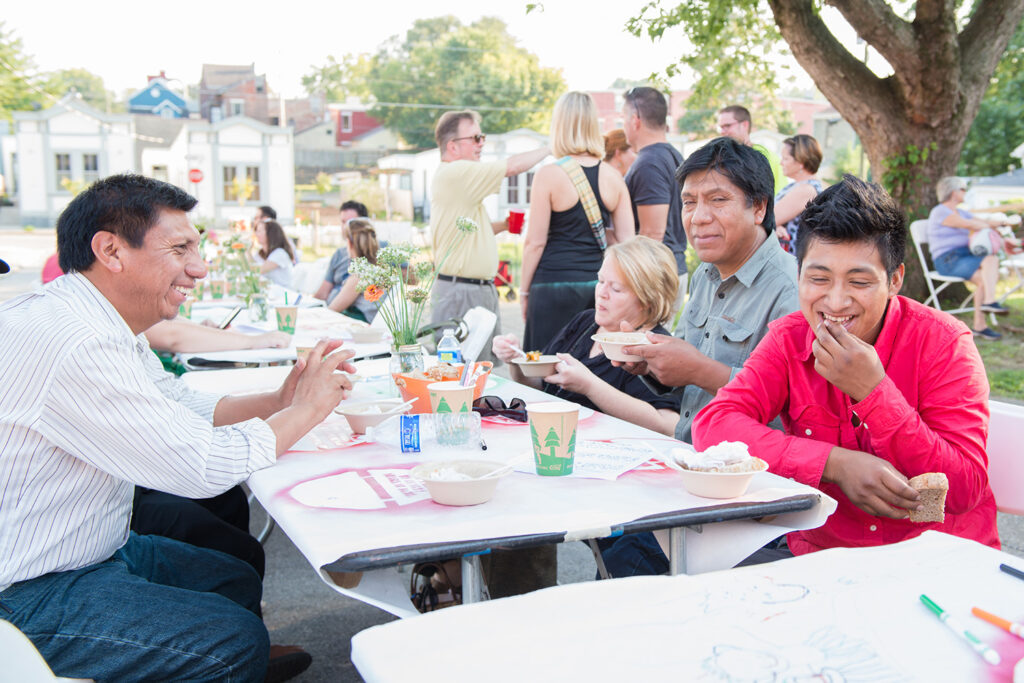2021 Pulse Check on Shared Stewardship for Thriving Together Across America
Summary
Although humans are capable of inflicting immense harm on each other and the environment, we also have a strong proclivity for love, kindness, and interdependence. Which tendency will prevail in the years to come? What will it take to live up to our potential to be good stewards of an equitable and thriving future? The answers depend on what we value, where we place our priorities for investment and action, and how fully we commit to practices for working together.
There is good news in this first-of-its-kind survey of stewardship values, priorities, and practices. There are also clues about where more work is needed.
Nearly all respondents affirm stewardship values for purpose, power, and wealth – Pulse Check contributors expressed almost universal agreement for three stewardship values related to purpose, power, and wealth. Across every subgroup studied, more than 90% of respondents affirmed that:
- Purpose in life must be larger than both oneself and one’s organization
- Every person should feel they have power to help shape the world they live in
- People and organizations should use their wealth to create conditions where all people can thrive

Such strongly espoused ideals stand in contrast to the daily lived reality in communities across America, a reality that is often marked by extreme individualism and organizational fragmentation, by feelings of powerlessness, and by a scramble for scarce resources alongside escalating wealth inequality. If these values are strongly held across the U.S., savvy stewards could leverage them to create a better America – by designing a system that enables all people to participate, prosper, and reach their full potential.
Beyond affirming core values, what does it take to design a system for everyone to thrive?
For example, who sees equal or unequal opportunities for well-being right now? And is system change even an important goal? On those pragmatic questions, Pulse Check contributors had encouraging but mixed opinions (with notable differences among subgroups).
- 78% see unequal opportunities for well-being – One quarter of respondents believe to some degree that all people in their communities already have an equal opportunity to live their best possible lives. Three-quarters report seeing unequal opportunities for well-being, which is more consistent with most empirical data.
- 73% want major system change – Three-quarters hope to see “major changes in America’s system of economic, social, or racial priorities,” whereas others prefer to fulfill unmet needs through projects and programs (22%) or to return to business as usual (2%).
- 26% work on system change as their most important goal – A quarter said that system change is their organization’s most important goal, along with another 60% who said that it is at least one of their organization’s goals (total of 86%). A distinct group (14%) said that system change is either not an important goal (9%) or not something they talk about (6%). Interestingly, 80% of respondents who strongly affirmed that some people in their community lack equal opportunities reported that system change was their organization’s top goal.
These findings indicate a significant but still incomplete nationwide commitment to create an equitable system for thriving together. Even though super-majorities of respondents acknowledge existing inequity and hope for comprehensive system change, only a quarter concentrate on system change as their most important organizational goal.
Can America create a just system for well-being with so few doing the heavy lifting? If not, how can we inspire more people and organizations to join with fellow stewards in a movement to thrive together?
What does the Pulse Check say about nationwide priorities for investment and action?
- 43% would invest more among those who have the most to gain – The largest fraction of respondents (43%) would invest more resources among those who have the most to gain—a group overwhelmingly made up of people who are denied equal opportunities because of color, class, gender, and other differences. Two smaller fractions would prioritize those who need just a little more help (29%) or would invest evenly among all groups (27%).
- 44% would prioritize vital conditions, while 32% would prioritize urgent services – Even during a national crisis, many respondents emphasize that investments to expand vital conditions should be the higher priority (in terms of everyone’s time, money, and effort).

There is no shortage of worthy investments that could alleviate suffering and expand the experience of thriving. The question is, where will organizational leaders place their priorities? Pulse Check contributors showed a preference for a portfolio that favors vital conditions over urgent services. There is also a popular desire for more resources to go to those who have the most to gain, even though there is not yet a consensus in favor of such equitable investing.
What do Pulse Check contributors say about routine practices for shared stewardship?
- 94% favor organizations working together – Nearly everyone believes that working together is the best way for their organization to achieve maximum impact, versus going it alone.
- 37% view working relationships as highly effective – Most respondents say relationships across organizations are positive, but there is a lot of room to improve: a majority say that working ties have only moderate or low effectiveness (54% and 8%, respectively).
- More than 90% rate their own stewardship practices highly, but fewer than 50% say the same about others – Respondents tend to report that their own organizations have high levels of involvement in collaborative activities but feel that other organizations tend to be less involved.
What do Pulse Check contributors regard as obstacles and momentum builders?
- 82% say their chief challenge is lack of funding – A large majority (82%) see inadequate funding as their main barrier. Indeed, for 41% it was the only obstacle they named. And when asked what would most help, 74% indicated that their greatest need is for additional resources.
- 45% favor being creative with existing resources (rather than seeking additional resources first) – Even though more resources would undoubtedly help, nearly half (45%) believe most problems can be improved by being more creative with existing resources.
- 55% look for momentum by valuing long-term progress, 43% by embracing a new narrative – More than half (55%) see the potential to generate momentum by placing greater value on sustaining long-term progress; 43% chose embracing a new narrative for thriving people and places.
Guidance for Strengthening Shared Stewardship
This survey’s most comprehensive indicator of the state of stewardship in America is our index of stewardship diffusion. It brings together more than a dozen measures of stewardship values, priorities, and practices. This study reveals that there is room to further spread the basic tenets of stewardship, with a mean index score of 65 out of 100. We should celebrate these signs that the main ideals of stewardship are widely endorsed. But there is danger in focusing on diffusion alone. Stewardship could become a passing fad or be practiced in a way that is too thin to matter. Our main challenge is to spread and deepen shared stewardship through our values, priorities, and practices. Only when stewardship fully takes hold in our head, heart, and hands will we be able to create a world in which all people can participate, prosper, and reach their full potential.
About a third of the respondents in this survey stand out as stronger stewards (those with diffusion scores of 75+; see Figure 23). We believe the remaining two thirds can strengthen their stewardship stance by deepening their values, priorities, and practices. How can they begin to make these important shifts? And what can stronger stewards do to take their existing commitments even further?
Figure 23: Stewardship diffusion score: How many are strong stewards? (n=348)
Embrace core stewardship values. Values and worldviews play a large role in shaping individual and organizational orientations to large-scale social change. Our Pulse Check findings show that more people can recognize that there are unequal opportunities for well-being across America. This change would likely affect the investment priorities of potential stewards and the approaches they employ to advance their work.
Three values stand out as especially foundational to enact this mindset shift:
- We can thrive together: We aspire to become thriving people in a thriving world and are committed to creating communities in which everyone has a fair chance to participate, prosper, and reach their full potential. Our best hope to realize a resilient and vibrant America for generations to come is to organize local and nationwide action around a single unifying and measurable expectation: All people and places thriving—no exceptions.
- Justice makes us all stronger: When large numbers of us are struggling, suffering, and experiencing unfair burdens, it frays our national fabric of justice and stability. Strong stewards reject structural racism and all forms of social exclusion as toxic forces that destroy lives and dehumanize us all. They celebrate human differences and diverse cultures as strengths, not liabilities, when trying to thrive together in a rapidly changing world.
- We can join each other in shared stewardship: Ordinary people in every walk of life, along with organizations in every sector or industry, can move into meaningful roles as shared stewards of well-being and justice. That is the way to co-create a society in which everyone can participate, prosper, and reach their full potential.
Align strategies and investments with key stewardship priorities. A willingness to invest equitably is necessary to transform an unjust system for the better. Pulse Check findings show that there is space to grow in persuading people to prioritize investments in those who have the most to gain. Potential and strong stewards everywhere can catalyze transformation by undergirding their strategies and investments with the following beliefs:
- Without vital conditions it is not possible to thrive: When vital conditions are absent or impaired, people tend to struggle and suffer, driving demand for urgent services. Urgent services are essential, but they are temporary fixes that don’t address broader, long-term conditions that are needed to thrive—we cannot “urgent service” our way to thriving.
- Without reckoning with ever-present legacies of justice and injustice, it is not possible to thrive together: We have inherited legacies that confer dignity and foster resilience. We have also inherited legacies that dehumanize, exclude, and inflict trauma. The decisions we make today will shape the legacies that we pass on to future generations.
- Without expanding belonging and civic muscle, we cannot work across differences as shared stewards of the systems that shape our lives: To achieve lasting change across the country, we need to ensure that all people feel they are an important part of their community. They need to be able to contribute meaningfully to the community’s vibrancy and to develop the power to co-create a better future. Building belonging and civic muscle strengthens social ties, increases trust and cooperation and makes it easier to work together. This creates a virtuous cycle: when people feel valued and cared for within the community, they are more likely to contribute to creating healthy, equitable places.
Adopt and deepen stewardship practices. While Pulse Check findings show that stewardship practices are widely understood, we appreciate that there is often a large gap between “doing something” and “doing it for real.” Having a strong stewardship practice means you show up as a steward every day, all day, in every way. It is reflected in the vitality, integration, and coherence of how you think and act. Where should you or your organization start? How can you build on your existing strengths?
Three categories of stewardship practice rise to the level of being essential because of their unique power to support and generate lasting change in any setting:
- Connect across differences: Stewardship is not a solo act, and it becomes increasingly powerful as more people and organizations are drawn into the work together. Strong stewards make connections across roles, departments, sectors, geographies, and cultural divides, and they are informed by place-based, multisector, and multicultural perspectives.
- Create opportunities for progress: Our success depends on actively breaking from the status quo by continually creating opportunities for a different future to take hold.
- Learn and adapt: Circumstances are constantly changing; adaptive approaches help us to move forward together, even in the face of uncertainty.
Of course, such values, priorities, and practices are easy to endorse but hard to enact and even harder to maintain. ReThink Health was founded with a stewardship focus more than a decade ago by a group of veteran changemakers that included Elinor Ostrom (who won a Nobel Prize for her work on stewardship), as well as Marshall Ganz, Peter Senge, Amory Lovins, Don Berwick, and others. Our focus from the beginning has been on learning how to become better stewards in real-world situations.
Stewardship needs to grow, and the 2021 Pulse Check shows promising signs that it is on the rise. But there is no guarantee that our early gains will take hold as a new status quo. Harmful business-as-usual practices resist change because the mindsets and behaviors associated with them have become so entrenched. But we can choose which legacies to continue, which to end, and which to renew. That choice starts with growing our own ability and accountability to embody stewardship norms and practices ourselves, both through outward initiatives and inward growth.

Resources
Reports
Thriving Together: A Springboard for Equitable Recovery and Resilience Across America
Shared Stewardship in Health Care
Stewardship + Equity: Rooting a New Rural Legacy
Initiatives and Networks
Well Being in the Nation (WIN) Network
Resource Collections
Community Commons: Stewardship Collection
Healthy Neighborhood Investments: A Policy Scan & Strategy Map
Goals and Measurement
The Science of Thriving Together
Well Being in the Nation (WIN) Measures
Multi-Media
Thriving Together Through Shared Stewardship


